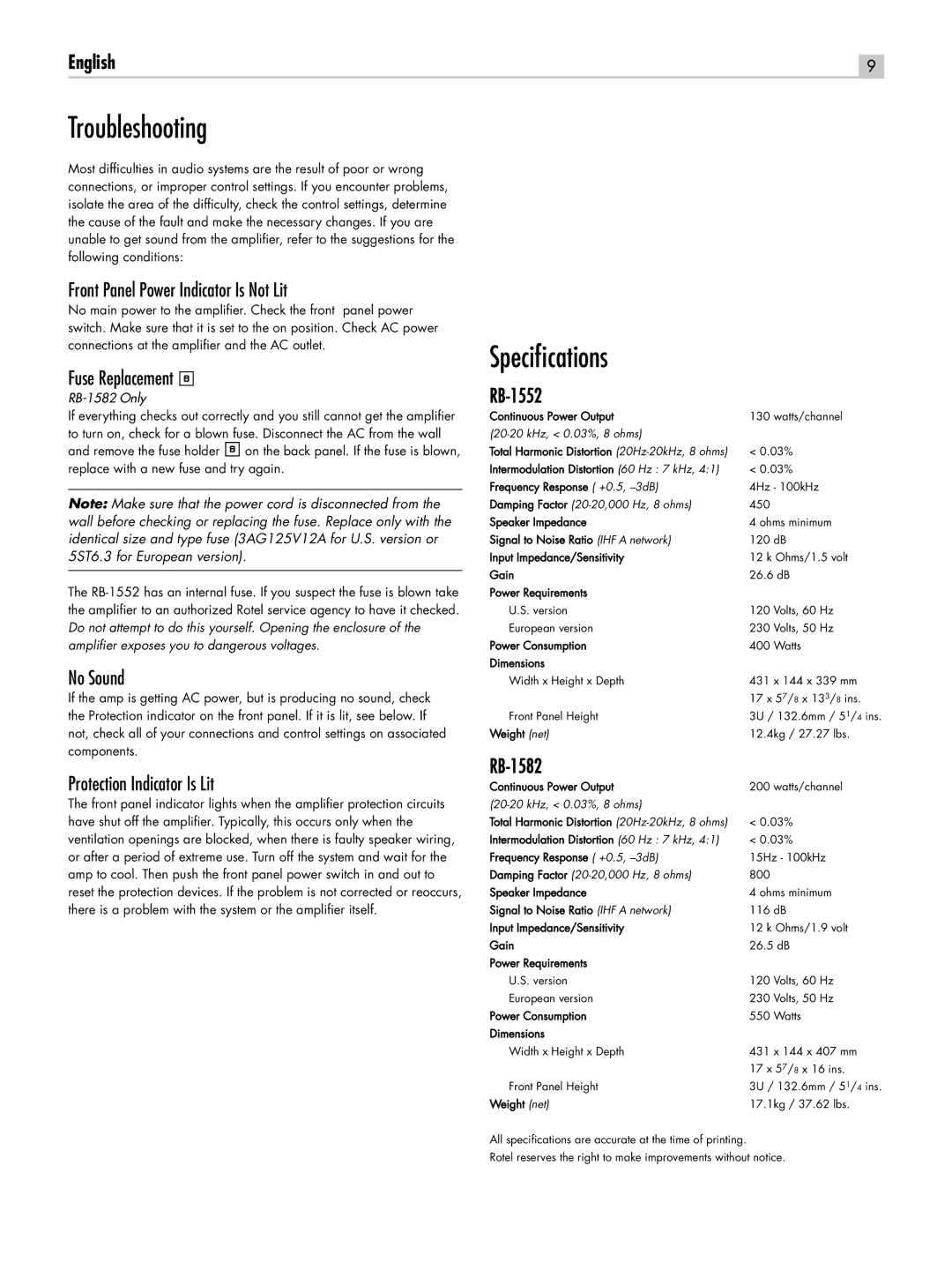
English |
|
9 |
Troubleshooting
Most difficulties in audio systems are the result of poor or wrong connections, or improper control settings. If you encounter problems, isolate the area of the difficulty, check the control settings, determine the cause of the fault and make the necessary changes. If you are unable to get sound from the amplifier, refer to the suggestions for the following conditions:
Front Panel Power Indicator Is Not Lit
No main power to the amplifier. Check the front panel power switch. Make sure that it is set to the on position. Check AC power connections at the amplifier and the AC outlet.
Fuse Replacement 8
RB-1582 Only
If everything checks out correctly and you still cannot get the amplifier to turn on, check for a blown fuse. Disconnect the AC from the wall and remove the fuse holder 8 on the back panel. If the fuse is blown, replace with a new fuse and try again.
Note: Make sure that the power cord is disconnected from the wall before checking or replacing the fuse. Replace only with the identical size and type fuse (3AG125V12A for U.S. version or 5ST6.3 for European version).
The
No Sound
If the amp is getting AC power, but is producing no sound, check the Protection indicator on the front panel. If it is lit, see below. If not, check all of your connections and control settings on associated components.
Protection Indicator Is Lit
The front panel indicator lights when the amplifier protection circuits have shut off the amplifier. Typically, this occurs only when the ventilation openings are blocked, when there is faulty speaker wiring, or after a period of extreme use. Turn off the system and wait for the amp to cool. Then push the front panel power switch in and out to reset the protection devices. If the problem is not corrected or reoccurs, there is a problem with the system or the amplifier itself.
Specifications
RB-1552
Continuous Power Output | 130 watts/channel | |
|
|
|
Total Harmonic Distortion | < 0.03% | |
Intermodulation Distortion (60 Hz : 7 kHz, 4:1) | < 0.03% | |
Frequency Response ( +0.5, | 4Hz - 100kHz | |
Damping Factor | 450 |
|
Speaker Impedance | 4 ohms minimum | |
Signal to Noise Ratio (IHF A network) | 120 dB | |
Input Impedance/Sensitivity | 12 k Ohms/1.5 volt | |
Gain | 26.6 dB | |
Power Requirements |
|
|
U.S. version | 120 | Volts, 60 Hz |
European version | 230 | Volts, 50 Hz |
Power Consumption | 400 | Watts |
Dimensions |
|
|
Width x Height x Depth | 431 x 144 x 339 mm | |
| 17 x 57/8 x 133/8 ins. | |
Front Panel Height | 3U / 132.6mm / 51/4 ins. | |
Weight (net) | 12.4kg / 27.27 lbs. | |
RB-1582
Continuous Power Output | 200 watts/channel | |
|
| |
Total Harmonic Distortion | < 0.03% | |
Intermodulation Distortion (60 Hz : 7 kHz, 4:1) | < 0.03% | |
Frequency Response ( +0.5, | 15Hz - 100kHz | |
Damping Factor | 800 |
|
Speaker Impedance | 4 ohms minimum | |
Signal to Noise Ratio (IHF A network) | 116 dB | |
Input Impedance/Sensitivity | 12 k Ohms/1.9 volt | |
Gain | 26.5 dB | |
Power Requirements |
|
|
U.S. version | 120 | Volts, 60 Hz |
European version | 230 | Volts, 50 Hz |
Power Consumption | 550 | Watts |
Dimensions |
|
|
Width x Height x Depth | 431 x 144 x 407 mm | |
| 17 x 57/8 x 16 ins. | |
Front Panel Height | 3U / 132.6mm / 51/4 ins. | |
Weight (net) | 17.1kg / 37.62 lbs. | |
All specifications are accurate at the time of printing.
Rotel reserves the right to make improvements without notice.
